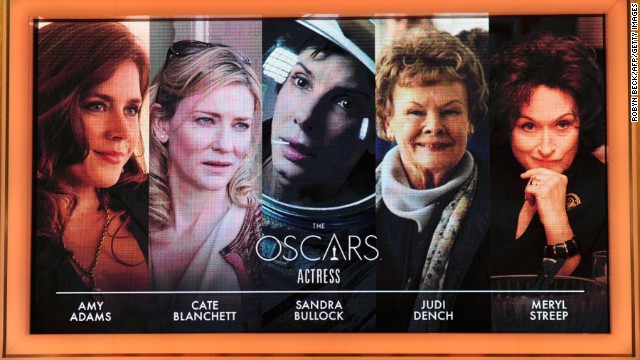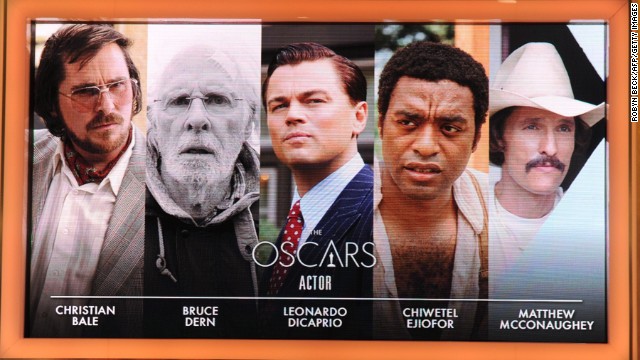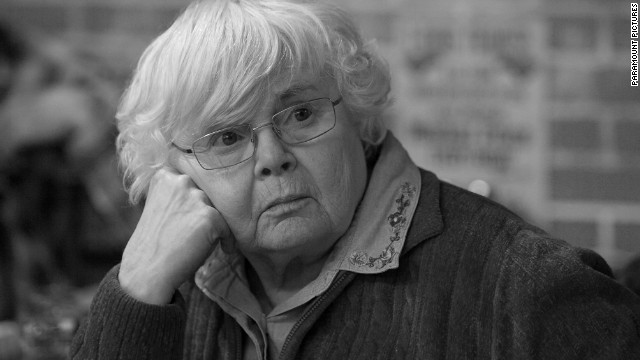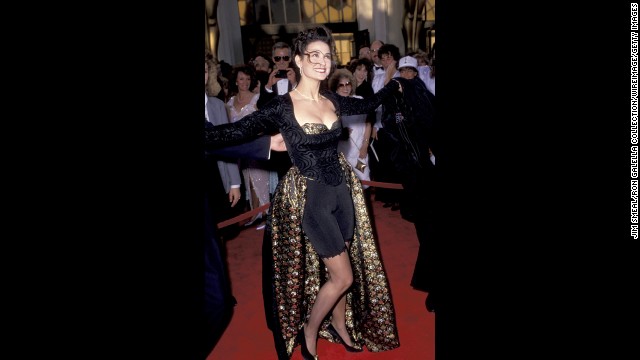Editor's note: Gene Seymour is a film critic who has written about music, movies and culture for The New York Times, Newsday, Entertainment Weekly and The Washington Post.
(CNN) -- This year's race for best actor at the Academy Awards was supposed to have been the most wide open in decades, with candidates ranging from two-time winner Tom Hanks for "Captain Phillips" to newcomer Oscar Isaac for "Inside Llewyn Davis."
The 77-year-old veteran Bruce Dern gave a signature performance as an addled senior citizen in "Nebraska," while Leonardo DiCaprio delivered a flamboyant tour de force in "The Wolf of Wall Street." And it was a banner year for black actors, with the Oscar-worthy performances of Forest Whitaker in "Lee Daniels' The Butler," Michael B. Jordan in "Fruitvale Station" and Chiwetel Ejiofor in "12 Years a Slave."
Now, with voting completed and less than a couple days away from Oscar night, the pundits, prognosticators and tea-leaf readers agree that the winner will be ... none of the above. Hanks, Isaac, Whitaker and Jordan weren't even nominated.

Gene Seymour
But Matthew McConaughey was. And as the AIDS patient who smuggles unapproved but effective medication to help others with the disease in "Dallas Buyers Club," McConaughey raised his ever-expanding professional profile as a versatile leading man while showing he could physically commit to his work. He shed almost 50 pounds and, going further, secluded himself from social interaction to achieve the gaunt pallor of a dying man.
That level of investment, combined with an intense performance, combined to make McConaughey such a prohibitive favorite for the best actor prize that, even with such sterling competition as Dern, DiCaprio, Ejiofor and Christian Bale, who gained weight and wore a comb-over wig as a con artist in "American Hustle," it would be a stunner if he loses.
If ... OK, fine, when McConaughey steps to the winner's circle Sunday night after his name is announced, it will represent the latest manifestation of the Motion Picture Academy of Arts and Sciences' historic tendency to honor actors who make heads swivel by changing their image, professional or physical; the more dramatic and conspicuous the transformation, the better the chances that actor, or actress, will be rewarded.
For instance, 10 years ago, onetime model Charlize Theron, who at the time had gained traction in her bid for serious consideration as an actress, made herself the all-but-inevitable best actress Oscar winner in "Monster" by becoming unrecognizably fat and grotesque as serial killer Aileen Wuornos.
 A history of Oscar-winning best actresses
A history of Oscar-winning best actresses
 Photos: A history of Oscar-winning best actors
Photos: A history of Oscar-winning best actors
 Oscar nominees over 80 and under 18
Oscar nominees over 80 and under 18
 Oscars: Best of the worst dresses
Oscars: Best of the worst dresses
Besides shaving her eyebrows and wearing prosthetic teeth, Theron had swollen her sylphlike frame by 30 pounds through heavy intakes of Stuff That Is Bad For You, mostly doughnuts and potato chips. This helped make her the -- sorry about this -- heavy favorite in a field that included then-newcomer Keisha Castle-Hughes for "Whale Rider," Diane Keaton for "Something's Gotta Give," Naomi Watts for "21 Grams" and Samantha Morton for "In America."
Bear in mind, of course, that Theron, before and since, showed keen acting chops even when assuming her regular, blade-like countenance.
Doesn't matter. Pretty people rarely get Oscars looking like themselves. Cary Grant, who some believe to have been the best actor of the early sound era and beyond, only got an Oscar years after his retirement. His still-indelible turns in "His Girl Friday" (1940) "Notorious" (1946) and "Charade" (1963) went unacknowledged. He never let you see him act. He just did. Maybe that was the problem.
Meanwhile, the template for physical-self-abasing-to-success was established back in 1980 when Robert De Niro portrayed boxer Jake La Motta. In "Raging Bull," he played both the taut middleweight champ in his prime and the bloated nightclub entertainer he became.
De Niro packed on 60 pounds in one of the more jarring nonmechanical special effects in movie history. Maybe he would have still won the Oscar without going to such extremes. But De Niro's efforts put him far ahead in a strong field that included career-enhancing performances by Robert Duvall in "The Great Santini" and Peter O'Toole in "The Stunt Man."
Meryl Streep transformed herself into Margaret Thatcher and won the 2012 best actress Oscar for "Iron Lady." She thanked her makeup artists.
Another example of an actor tamping down glamor for gold came when George Clooney won best supporting actor in 2006's "Syriana."
Clooney, the exemplar of movie-star sleekness, took on facial hair and 30 pounds to play the luckless CIA agent Robert Bair. Some observers believed the Oscar was as much for Clooney's good works, including his direction of that year's critically acclaimed "Good Night and Good Luck," as for his performance. But the rewards for sacrificing physical beauty were acknowledged nonetheless.
The daring doesn't always work and De Niro, again, offers an example, having shed 35 pounds and worked himself into a solitary grind as a cabbie to prepare for the role of lone gunman Travis Bickle in 1976's "Taxi Driver."
He was nominated, but lost to the late Peter Finch as the comparably unhinged Howard Beale in "Network." Among the many possible reasons for De Niro's deferred lead-actor Academy honor is that, at the time, he hadn't yet established an image that could be dramatically overturned or re-set in voters' minds.
Because, more than anything else, even a better performance, Hollywood loves to see a performer overturn pre-existing expectations.
Was Dustin Hoffman's gnarled, doomed Ratzo Rizzo in 1969's "Midnight Cowboy" better than John Wayne's dyspeptic, one-eyed Rooster Cogburn in "True Grit" that same year? Maybe, but it was an all-but-foregone conclusion going into the Oscar ceremony that Wayne would get the gold statuette for mucking around with his persona.
Jeff Bridges would, 30 years later, also be nominated for assuming Rooster's eye-patch and ill temper in a "True Grit" remake. But Bridges' sixth Oscar nomination was overshadowed by finally winning best actor the year before for portraying a seedy, recidivist country-western singer in "Crazy Heart."
Although it was nice to see Bridges win the prize, it seemed to many critics that Bridges had by then submitted more than a dozen performances that were smarter, subtler and more flattering than that of a mendacious substance abuser so in need of cash that he needs to pee in a bottle while driving between gigs. His most iconic role, The Dude in 1998's "The Big Lebowski," wasn't even nominated that year.
But when an actor's time has come as it did for Bridges, Wayne, De Niro, Theron and others, precedents flutter noiselessly into the California ozone. Matthew McConaughey's time, it is widely believed, has come this year through a combination of circumstance, timing, fortune -- and crash dieting.
(CNN) -- This year's race for best actor at the Academy Awards was supposed to have been the most wide open in decades, with candidates ranging from two-time winner Tom Hanks for "Captain Phillips" to newcomer Oscar Isaac for "Inside Llewyn Davis."
The 77-year-old veteran Bruce Dern gave a signature performance as an addled senior citizen in "Nebraska," while Leonardo DiCaprio delivered a flamboyant tour de force in "The Wolf of Wall Street." And it was a banner year for black actors, with the Oscar-worthy performances of Forest Whitaker in "Lee Daniels' The Butler," Michael B. Jordan in "Fruitvale Station" and Chiwetel Ejiofor in "12 Years a Slave."
Now, with voting completed and less than a couple days away from Oscar night, the pundits, prognosticators and tea-leaf readers agree that the winner will be ... none of the above. Hanks, Isaac, Whitaker and Jordan weren't even nominated.

Gene Seymour
But Matthew McConaughey was. And as the AIDS patient who smuggles unapproved but effective medication to help others with the disease in "Dallas Buyers Club," McConaughey raised his ever-expanding professional profile as a versatile leading man while showing he could physically commit to his work. He shed almost 50 pounds and, going further, secluded himself from social interaction to achieve the gaunt pallor of a dying man.
That level of investment, combined with an intense performance, combined to make McConaughey such a prohibitive favorite for the best actor prize that, even with such sterling competition as Dern, DiCaprio, Ejiofor and Christian Bale, who gained weight and wore a comb-over wig as a con artist in "American Hustle," it would be a stunner if he loses.
If ... OK, fine, when McConaughey steps to the winner's circle Sunday night after his name is announced, it will represent the latest manifestation of the Motion Picture Academy of Arts and Sciences' historic tendency to honor actors who make heads swivel by changing their image, professional or physical; the more dramatic and conspicuous the transformation, the better the chances that actor, or actress, will be rewarded.
For instance, 10 years ago, onetime model Charlize Theron, who at the time had gained traction in her bid for serious consideration as an actress, made herself the all-but-inevitable best actress Oscar winner in "Monster" by becoming unrecognizably fat and grotesque as serial killer Aileen Wuornos.
 A history of Oscar-winning best actresses
A history of Oscar-winning best actresses  Photos: A history of Oscar-winning best actors
Photos: A history of Oscar-winning best actors  Oscar nominees over 80 and under 18
Oscar nominees over 80 and under 18  Oscars: Best of the worst dresses
Oscars: Best of the worst dresses Besides shaving her eyebrows and wearing prosthetic teeth, Theron had swollen her sylphlike frame by 30 pounds through heavy intakes of Stuff That Is Bad For You, mostly doughnuts and potato chips. This helped make her the -- sorry about this -- heavy favorite in a field that included then-newcomer Keisha Castle-Hughes for "Whale Rider," Diane Keaton for "Something's Gotta Give," Naomi Watts for "21 Grams" and Samantha Morton for "In America."
Bear in mind, of course, that Theron, before and since, showed keen acting chops even when assuming her regular, blade-like countenance.
Doesn't matter. Pretty people rarely get Oscars looking like themselves. Cary Grant, who some believe to have been the best actor of the early sound era and beyond, only got an Oscar years after his retirement. His still-indelible turns in "His Girl Friday" (1940) "Notorious" (1946) and "Charade" (1963) went unacknowledged. He never let you see him act. He just did. Maybe that was the problem.
Meanwhile, the template for physical-self-abasing-to-success was established back in 1980 when Robert De Niro portrayed boxer Jake La Motta. In "Raging Bull," he played both the taut middleweight champ in his prime and the bloated nightclub entertainer he became.
De Niro packed on 60 pounds in one of the more jarring nonmechanical special effects in movie history. Maybe he would have still won the Oscar without going to such extremes. But De Niro's efforts put him far ahead in a strong field that included career-enhancing performances by Robert Duvall in "The Great Santini" and Peter O'Toole in "The Stunt Man."
Meryl Streep transformed herself into Margaret Thatcher and won the 2012 best actress Oscar for "Iron Lady." She thanked her makeup artists.
Another example of an actor tamping down glamor for gold came when George Clooney won best supporting actor in 2006's "Syriana."
Clooney, the exemplar of movie-star sleekness, took on facial hair and 30 pounds to play the luckless CIA agent Robert Bair. Some observers believed the Oscar was as much for Clooney's good works, including his direction of that year's critically acclaimed "Good Night and Good Luck," as for his performance. But the rewards for sacrificing physical beauty were acknowledged nonetheless.
The daring doesn't always work and De Niro, again, offers an example, having shed 35 pounds and worked himself into a solitary grind as a cabbie to prepare for the role of lone gunman Travis Bickle in 1976's "Taxi Driver."
He was nominated, but lost to the late Peter Finch as the comparably unhinged Howard Beale in "Network." Among the many possible reasons for De Niro's deferred lead-actor Academy honor is that, at the time, he hadn't yet established an image that could be dramatically overturned or re-set in voters' minds.
Because, more than anything else, even a better performance, Hollywood loves to see a performer overturn pre-existing expectations.
Was Dustin Hoffman's gnarled, doomed Ratzo Rizzo in 1969's "Midnight Cowboy" better than John Wayne's dyspeptic, one-eyed Rooster Cogburn in "True Grit" that same year? Maybe, but it was an all-but-foregone conclusion going into the Oscar ceremony that Wayne would get the gold statuette for mucking around with his persona.
Jeff Bridges would, 30 years later, also be nominated for assuming Rooster's eye-patch and ill temper in a "True Grit" remake. But Bridges' sixth Oscar nomination was overshadowed by finally winning best actor the year before for portraying a seedy, recidivist country-western singer in "Crazy Heart."
Although it was nice to see Bridges win the prize, it seemed to many critics that Bridges had by then submitted more than a dozen performances that were smarter, subtler and more flattering than that of a mendacious substance abuser so in need of cash that he needs to pee in a bottle while driving between gigs. His most iconic role, The Dude in 1998's "The Big Lebowski," wasn't even nominated that year.
But when an actor's time has come as it did for Bridges, Wayne, De Niro, Theron and others, precedents flutter noiselessly into the California ozone. Matthew McConaughey's time, it is widely believed, has come this year through a combination of circumstance, timing, fortune -- and crash dieting.